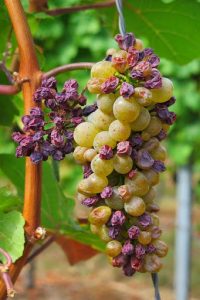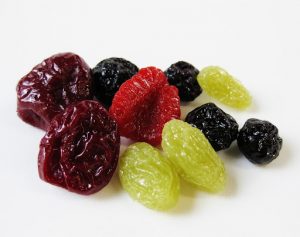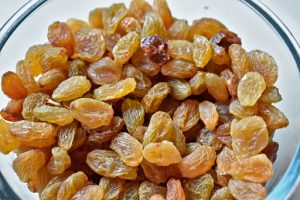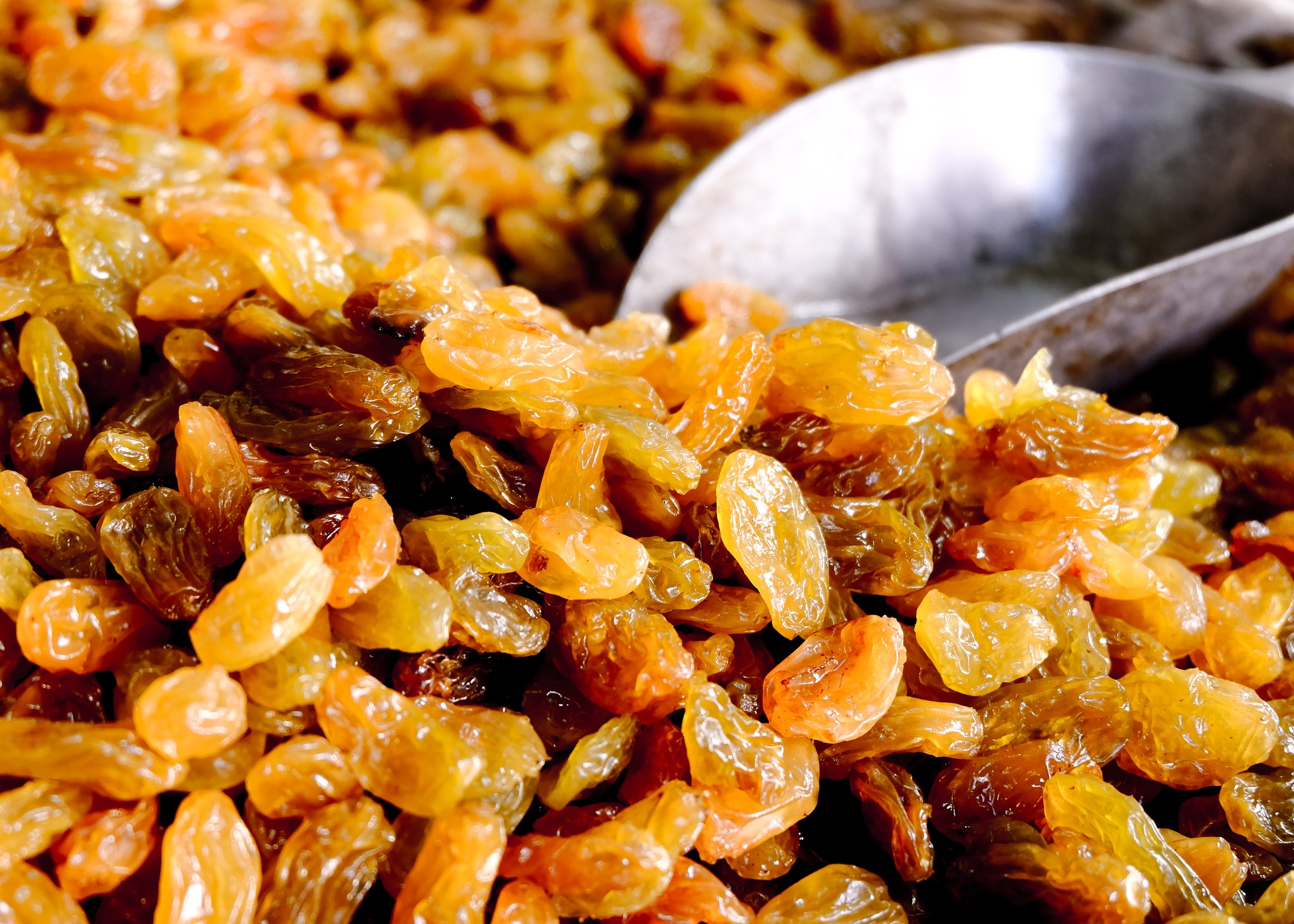Raisins are a great source of essential nutrients. This dried fruit makes a healthy snack, but it can also add a different texture to many dishes. So can you eat raisins on a plant-based diet?
Raisins come from whole fruits, so they are plant-based. It can make a quick pocket snack to munch on during the day. You can also add them to yogurt, oatmeal, or nuts.
In the US, California tops the commercial production of raisins. According to the Agricultural Marketing Resource Center, the US produced 275,000 metric tons of raisins in 2017-18. It’s fair to say that raisin is perhaps America’s most favorite dried fruit.
What are Raisins?

Raisins are dried grapes that have been dried either in the sun or in a food dehydrator. Naturally sweet, these are whole foods.
How Are Raisins Made?
Sun-drying is the primary method of making raisins from grapes. When grapes dry in the sun, all the water inside evaporates. As a result, raisins are much smaller than grapes.
The grapes usually go through a pre-treatment that allows more water to evaporate. Potassium carbonates and alkaline solutions are common for pre-treatment.
Then the grapes are left to dry in the sun. This process is slow and can take anywhere from a few days to perhaps a few weeks. Once dried, the grapes have turned into raisins, which are washed and processed for packaging.
Varieties of Raisins
You’ve probably seen raisins in brown, yellow, and purple colors. The colors vary by the type of grapes used for the raisin. As a result, there are quite a lot of varieties.
Natural Seedless Raisins
These are also called Thompson Seedless Raisins and are the most popular in the US. These sun dried raisins are made from green grapes. Most of the raisins from California are Thompson Seedless Raisins.
Sultanas
In the US, Sultanas are usually called golden raisins. These come from large yellowish-green Sultana grapes.
Flame Seedless Raisins
These raisins get their name from the Flame seedless red grapes. Therefore, their color is dark red, and they are very sweet.
Currants
Currants have a very dark color and a tangy taste. These come from small Black Corinth grapes, so these are some of the smallest raisins. Another name for Currants is Zante Currants.
Muscat Raisins
Made from big green-colored Muscat grapes, these raisins are big and have a brown color. The taste is quite fruity, and they contain seeds.

Nutrients in Raisins
Raisins are rich in many important nutrients, but you should know what they are to reap maximum benefits.
Think of them as concentrated grapes. As a result, the nutritional profile is pretty much the same, but raisins may have some nutrients slightly higher. Also, you should be mindful of the calories in raisins. Their small size can give the impression they don’t have a lot of calories. But, don’t worry, you can still eat these raisins on a plant-based diet.
Here’s the nutritional breakdown of 100 grams of some popular varieties of raisins, as per USDA FoodCentral database:
| Raisins, golden, seedless | Raisins, dark, seedless | Currants | |
| Calories (kcal) | 301 | 299 | 290 |
| Carbohydrates (grams) | 80 | 79.3 | 76.9 |
| Fiber (grams) | 3.3 | 4.5 | 4.4 |
| Fat (grams) | 0.2 | 0.25 | 0.22 |
| Protein (grams) | 3.2 | 3.3 | 3.4 |
| Sugars (grams) | 65.7 | 65.1 | 62.2 |
| Potassium (mg) | 746 | 744 | 777 |
| Calcium (mg) | 64 | 62 | 88 |
| Phosphorus (mg) | 101 | 98 | 99 |
| Iron (mg) | 0.9 | 1.7 | 1.8 |
| Vitamin C (mg) | 3.2 | 2.3 | 4.7 |
As you can see, raisins are wholesome dried fruits with plenty of important nutrients. However, some are more dominant than others.
Carbs
Is a raisin a carb? Yes, it’s mostly carbs, but it’s not a processed carb. Whole fruits rich in carbs are a good source of these nutrients. However, as long as you keep your overall intake in check, these carbs will only benefit you.
Fiber
A hundred grams of raisins comes to about half a cup. So with half a cup, you get 3.3 to 4.4 grams of fiber. According to the Dietary Guidelines for Americans, you need 14 to 30.8 grams of fiber per 1000 calories. Therefore, raisins can provide anywhere from 10 to 23.5% of your daily fiber intake.
Fiber has many benefits, including digestion improvement, cholesterol control, and calorie control.
Potassium
Raisins are rich in Potassium and can help provide a significant percentage of your daily intake. A half-cup contains 746 mg of Potassium. That’s 16 to 25% of your recommended daily intake of Potassium, according to the Dietary Guidelines.
Raisins can be a good alternative to other Potassium-rich plant-based foods that you perhaps don’t like. For instance, if you don’t like bananas, you can add more raisins to your daily diet to cover the RDI.
Calcium
Raisins can cover 4% of your daily intake of Calcium. This mineral is extremely important, especially for the health of your bones. For women in middle ages, it’s all the more important, as they are prone to osteoporosis.
There’s another mineral in raisins that amplifies the effect of Calcium. Boron, together with Vitamin D, works to keep joints and bones strong.

Are Raisins High in Sugar?
The nutrient breakdown of raisins shows that they are not a low-calorie food. In fact, the sugars, in particular, are comparable with that of a soda can.
A soda can typically contains 33 grams of sugars. On the other hand, a half cup of raisins contains 65.7 grams of sugars. That’s pretty high if you’re trying to stay off sugars.
The sugars in raisins are a combination of glucose and fructose. The reason why it’s high in sugars is that it’s quite concentrated. When the water from the grapes evaporates, the percentage of sugar in the total composition rises.
This is not unique to raisins, dried fruits usually have higher calories and sugars. This is why portion control is important to reap the benefits. If you’re just snacking on raisins, 100 calories should be fine.
Raisins typically come pre-packaged in small amounts, so if you eat one pack, you don’t have to worry about sugars that much. However, when cooking with them, keep the calories and sugars in mind.
Are Raisins Good For You?
Can you eat raisins on a plant-based diet and benefit? Yes, they are highly nutritious, and many of their health benefits have been scientifically proven.
Help With Digestion
Raisins contain soluble fiber, which is essential for good digestive health. It can also help with constipation, which is a common problem for the elderly. With raisins as part of your daily diet, you’ll find more regularity in your bowel movement.
Rich in Antioxidants
Raisins are incredibly rich in some antioxidants like phenols and polyphenols. The antioxidants, which are also called phytonutrients, can help protect cells from damage.
They do this by eliminating free radicals in the body that can potentially harm cells. Therefore, these antioxidants can prevent many diseases, including heart diseases and cancer.
Keeps Heart Healthy
In addition to antioxidants, raisins are also rich in Potassium, which can help relax your blood vessels. These are also low in sodium, so there’s no negative impact on your heart health.
A study in Postgraduate Medicine found that regularly eating raisins could reduce heart disease risk by regulating blood pressure.
Prevents Anemia
Raisins contain iron that can prevent anemia, which is caused by a deficiency of iron. Many people fear that a plant-based diet can result in iron deficiency. However, most iron comes from vegetables and fruits, including raisins.
More importantly, raisins contain non-heme iron, which has more benefits than heme iron (meat iron). This video explores the difference and effects of heme and non-heme iron.
Good for Eyes
The antioxidants in raisins that fight cell degeneration can protect eye cells from the free radicals. This can help prevent age-related eye disorders like cataracts and macular degeneration.
Lower Blood Sugar
The same Postgraduate Medicine study also compared the effect of raisins on blood sugar with other snacks. It noted that these fruity snacks could help lower blood sugar levels. This is quite interesting, considering they have a high amount of sugars.
The study found that raisins lower HB1Ac with regular intake. It means that those with type II diabetes can also enjoy raisins in decent amounts. One serving should make a healthy choice for satisfying any sweet cravings for patients with diabetes.
Protects Gums and Teeth
One study from the Journal of Nutrition found that the phytochemicals in raisins are good for gums and teeth. These compounds are antimicrobial, so they kill the cavity-causing bacteria in the mouth.
Reduces Acidity
If you notice, most of the minerals in raisins are alkaline. Iron, copper, and certain Vitamins have a pH higher than 7. These can reduce acidity in the stomach from other foods in your diet.
Guidelines For Eating Raisins on a Plant-based Diet
So can you eat raisins on a plant-based diet? The answer is a resounding yes. These are healthy dried fruits with benefits for the whole body. Not only do these improve health but also act as a preventive barrier for life-threatening diseases.
Despite raisin’s proven benefits, you have to take into account that these are high calorie and high sugar. It’s imperative to keep a check on your sugar intake and overall calories to truly benefit from a plant-based diet.
How to Eat Raisins?
There are so many ways to enjoy raisins. The best way to consume raisins is to eat it like a snack. Many companies make small servings of raisins in packs that are portable and make a healthy snack. You can keep those on you and eat anytime you feel a little hungry.
Desserts with raisins are especially popular. For instance, these apple raisin mini muffins combine the benefits of two delicious fruits. If you use whole wheat flour, you can make them even healthier.
Most people think of raisins as a breakfast or snack food. However, you can also find raisins in savory dishes. Many Mediterranean and Middle Eastern cuisines use raisins in savory dishes to add sweetness.
Rice pilaf with raisins is one example of a plant-based savory dish with raisins. The sweetness from raisins can balance the spices in such savory dishes. Also, the variety of texture makes flavors more complex.
FAQs
Are Raisins Keto?
Fruits are generally not a good fit for the ketogenic diet. Most fruits contain carbs and sugar, which can lead to overconsumption of carbs. Since raisins come from grapes and have high carbs, they are not exactly keto-friendly.
Even half a cup or 100 grams of raisins has more carbs than what you’re typically allowed to eat on a keto diet (50 to 60 grams of carbs). However, if you’re eating raisins in a side dish or dessert, it might be okay to eat them. There are probably not that many raisins to break your threshold.
Are Raisins Gluten-free?
Raisins, like most dried fruits, are completely gluten-free. However, as someone with gluten intolerance, you should opt for raisins with minimal or no processing. This is to prevent any contamination. Therefore, simply go for the raisins clearly marked as gluten-free.
Can Raisins Help You Gain Weight?
Gaining weight on a plant-based diet can be challenging. However, it’s not impossible, and raisins can help with that. These are highly sugary and rich in carbs, two things that make you gain weight.
You would need to eat more than the recommended portion for raisins to add some pounds. However, eating too much sugar can be hazardous too. Therefore, make sure that your overall sugar intake does not get dangerously high.
Wrap Up
Now that your question ‘can you eat raisins on a plant-based diet’ has been answered, the next time you see raisins in the supermarket, make sure to buy some. Some varieties may offer more nutrients per calorie, but you can really eat any type.
While almost all raisins are sweet, some are less sweet but tangier. If you’re a person who does not like sweet things so much, go for currants.
You may also like: WHAT CAN YOU EAT ON A PLANT BASED DIET >>CLICK HERE!










